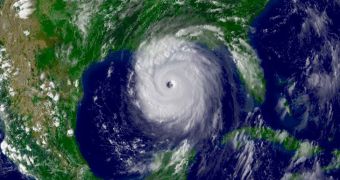When it comes to black widow spiders, it's common knowledge that females are way more terrifying than males. Oddly enough, it turns out that the same is true for hurricanes that hit the United States on a yearly basis.
Thus, a new paper in the journal Proceedings of the National Academy of Sciences shows that, when compared to hurricanes with a manly moniker, those named after ladies result in a higher death toll.
Interestingly enough, this is not due to the fact that hurricanes with lady names are more powerful or more devastating than the ones named after men. On the contrary, it all boils down to what people think is in a name.
Specialist Kiju Jung with the University of Illinois in the United States explains that, according to evidence at hand, people tend to fear hurricanes with masculine names more than storms of this kind that are named after women.
Hence, more folks tend to seek shelter when a hurricane named Christopher or Victor is heading their way than when specialists warn Eloise or Belle will soon reach their doorstep, researcher Kiju Jung details.
“In judging the intensity of a storm, people appear to be applying their beliefs about how men and women behave. This makes a female-named hurricane, especially one with a very feminine name such as Belle or Cindy, seem gentler and less violent,” says study co-author Sharon Shavitt.
Furthermore, “People imagining a ‘female’ hurricane were not as willing to seek shelter. The stereotypes that underlie these judgments are subtle and not necessarily hostile toward women – they may involve viewing women as warmer and less aggressive than men.”
The problem is that, contrary to what people think of hurricanes sporting lady names, such storms can be as deadly as the ones named after men. This is because hurricane names are assigned arbitrarily, and not based on their intensity.
“Names are assigned arbitrarily, based on a predetermined list of alternating male and female names. If people in the path of a severe storm are judging the risk based on the storm's name, then this is potentially very dangerous,” Kiju Jung stresses.
In light of these findings, the University of Illinois specialists who worked on this research project recommend that the media, meteorologists, policymakers and the public leave out gender-based stereotypes when it comes to hurricane preparedness.
Interestingly enough, it is only recently that hurricanes in the United States have started being given male names. Thus, due to the unpredictable nature of such weather events, meteorologists only gave them female names for several decades.

 14 DAY TRIAL //
14 DAY TRIAL //